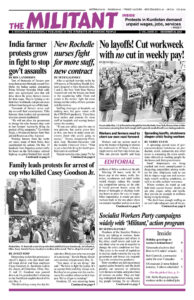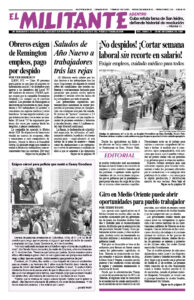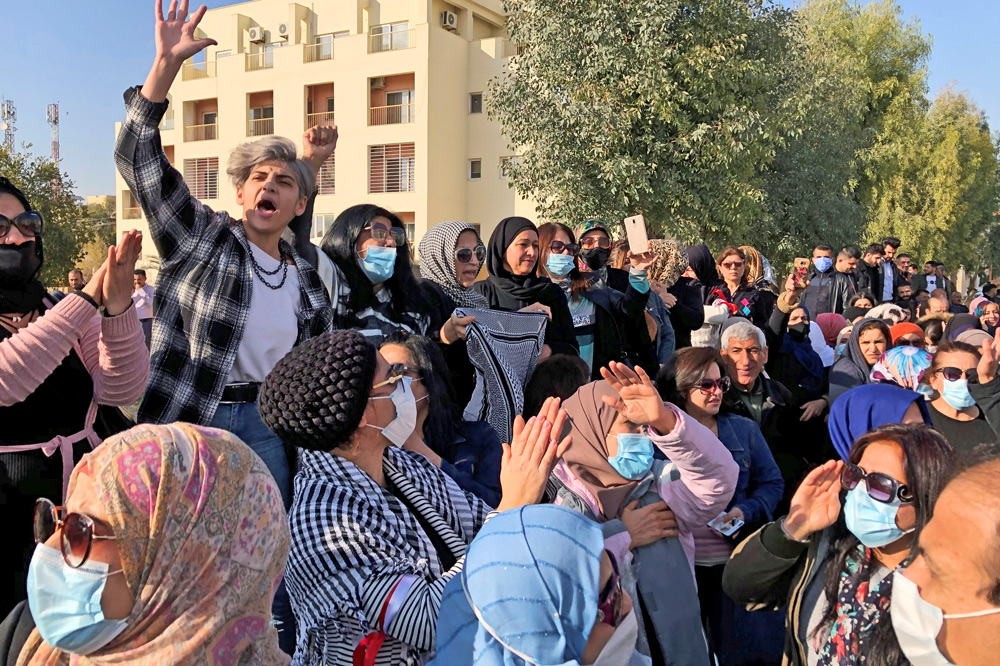Teachers and other public employees, fed up with working for months without being paid, protested demanding back wages Dec. 2 in the city of Sulaymaniyah in the Kurdistan Region of Iraq. When they tried to march again the next day, the police attacked them with tear gas, rubber bullets, water cannon and live ammunition.
The protests rapidly spread to other villages and towns. Workers and youth — angry over a lack of jobs and services, such as water, electricity and health care, and over corruption and a political system that benefits a handful of wealthy families — took to the streets for more than a week across Sulaymaniyah and Halabja provinces.
“There have been protests over unpaid wages from time to time over years, but it’s on another level this time,” journalist Rebaz Majeed told the Militant by phone from Sulaymaniyah Dec. 13.
In a number of towns protesters torched government and political parties’ offices, including those of the Kurdistan Democratic Party (KDP) and the Patriotic Union of Kurdistan (PUK) — the two main ruling parties in the Kurdistan Regional Government historically linked to the fight for Kurdish rights — and of smaller parties like Gorran, the change movement. In Said Sadiq, the offices of the Communist Party were attacked.
Protesters “are against the whole system, they’re tired of all parties,” Majeed said. “They blame the ruling parties, but also the opposition for not doing anything meaningful.”
“These are mostly young people, students and unemployed workers,” Sangar Youssif Salih, a university lecturer and executive director of the Peace and Freedom Organization, a human rights group, said by phone from Erbil, capital of the Kurdistan Regional Government. “They have nothing to lose.”
As of Dec. 11, at least seven protesters, mostly young men and teenagers, had been killed by police or security forces affiliated with the KDP or PUK. One hundred have been injured and hundreds detained. In Erbil and Dohuk, controlled by the KDP, authorities have prevented protests.
Several members of parliament from the Gorran party were stopped by the police from joining the protests in Sulaymaniyah Dec. 11. Members of the Kurdistan Communist Party have been arrested for joining as well. “Our comrades in the entire KRG are participating in the protests,” Hiwa Omar, a member of the Political Bureau of the Kurdistan Communist Party, told the Militant Dec. 12.
NRT-TV, linked to the opposition New Generation Party, had its broadcast license suspended after the recent protests. And Rudaw Media Network, the main news agency in the region, was warned by the government to refrain from broadcasting “violent scenes” or material that incites “disturbing of social cohesion.”
Savan Abdulrahman, editor of a cultural website from Sulaymaniyah, said authorities are now breaking up “any gathering of more than five people.” Nevertheless, 1,000 people attempted to protest there Dec. 11, she said.
Working people also face the consequences of government-imposed lockdowns in response to the COVID-19 epidemic.
“We were under lockdown from mid-March to the end of April. You could only go out to buy food,” Halwest Karim said from Erbil. “People said it was not for protecting us but controlling us.” Many shops never reopened when the lockdown ended.
“The lockdown was terrible,” university teacher Kanyaw Ebubekir said from Sulaymaniyah Dec. 13. “People working in the bazaar had no income. After one month they started to demonstrate, saying ‘it’s better to die from the virus’” than to die of starvation. “I work for a private university, so I’ve been paid every month. But I’ve had a 30% pay cut,” he said. “And prices of food are the same or even higher.”
Baghdad seeks to reassert control
The crisis is exacerbated by the national oppression of the Kurdish people at the hands of the regime in Baghdad and by the legacy of imperialist domination.
The Kurdish people have faced national oppression since the founding of the modern Iraqi state in the aftermath of World War I. A powerful Kurdish uprising in the wake of the 1990-91 Gulf War and U.S. intervention won significant autonomy.
“The Kurdish people have come to the center stage in world politics as never before, not primarily as victims, but as courageous and determined fighters for national rights,” SWP National Secretary Jack Barnes wrote at the time in New International no. 7.
The KRG has been hit by a drop in the price of oil and an ongoing dispute with the federal government in Baghdad over control of oil and customs revenues. In April, Baghdad stopped sending the KRG its agreed-upon 12% share of the federal budget, accusing KRG officials of violating an agreement to hand over 250,000 barrels of oil per day. In face of the protests, Erbil has agreed to send the oil in return for its budget share.
“Some public employees want their wages paid direct from Baghdad, because the Iraqi government doesn’t delay it,” Abdulrahman said. “That may be good for those who need money now, but it erases 30 years of what the Kurdish people gained.”
Iraqi Prime Minister Mustafa Al-Kadhimi has feigned sympathy with the protests, seeking to take advantage of anger directed at the Kurdish authorities to take steps to reassert Baghdad’s control over the region.
Over the past year, working people in Arab-majority parts of Iraq have also staged determined protests over similar economic conditions, as well as against the intervention by Tehran and Washington into the country’s politics.


